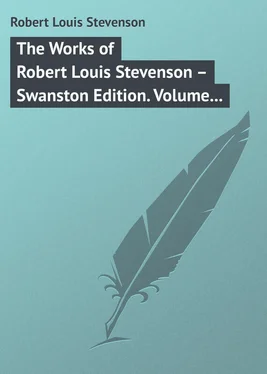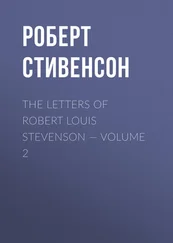Robert Stevenson - The Works of Robert Louis Stevenson – Swanston Edition. Volume 24
Здесь есть возможность читать онлайн «Robert Stevenson - The Works of Robert Louis Stevenson – Swanston Edition. Volume 24» — ознакомительный отрывок электронной книги совершенно бесплатно, а после прочтения отрывка купить полную версию. В некоторых случаях можно слушать аудио, скачать через торрент в формате fb2 и присутствует краткое содержание. Жанр: foreign_prose, на английском языке. Описание произведения, (предисловие) а так же отзывы посетителей доступны на портале библиотеки ЛибКат.
- Название:The Works of Robert Louis Stevenson – Swanston Edition. Volume 24
- Автор:
- Жанр:
- Год:неизвестен
- ISBN:нет данных
- Рейтинг книги:3 / 5. Голосов: 1
-
Избранное:Добавить в избранное
- Отзывы:
-
Ваша оценка:
- 60
- 1
- 2
- 3
- 4
- 5
The Works of Robert Louis Stevenson – Swanston Edition. Volume 24: краткое содержание, описание и аннотация
Предлагаем к чтению аннотацию, описание, краткое содержание или предисловие (зависит от того, что написал сам автор книги «The Works of Robert Louis Stevenson – Swanston Edition. Volume 24»). Если вы не нашли необходимую информацию о книге — напишите в комментариях, мы постараемся отыскать её.
The Works of Robert Louis Stevenson – Swanston Edition. Volume 24 — читать онлайн ознакомительный отрывок
Ниже представлен текст книги, разбитый по страницам. Система сохранения места последней прочитанной страницы, позволяет с удобством читать онлайн бесплатно книгу «The Works of Robert Louis Stevenson – Swanston Edition. Volume 24», без необходимости каждый раз заново искать на чём Вы остановились. Поставьте закладку, и сможете в любой момент перейти на страницу, на которой закончили чтение.
Интервал:
Закладка:
On one of your tables keep a great map spread out; a chart is still better – it takes one further – the havens with their little anchors, the rocks, banks, and soundings, are adorably marine; and such furniture will suit your ship-shape habitation. I wish I could see those cabins; they smile upon me with the most intimate charm. From your leads, do you behold St. Paul’s? I always like to see the Foolscap; it is London per se and no spot from which it is visible is without romance. Then it is good company for the man of letters, whose veritable nursing Pater-Noster is so near at hand.
I am all at a standstill; as idle as a painted ship, but not so pretty. My romance, which has so nearly butchered me in the writing, not even finished; though so near, thank God, that a few days of tolerable strength will see the roof upon that structure. I have worked very hard at it, and so do not expect any great public favour. In moments of effort, one learns to do the easy things that people like. There is the golden maxim; thus one should strain and then play, strain again and play again. The strain is for us, it educates; the play is for the reader, and pleases. Do you not feel so? We are ever threatened by two contrary faults: both deadly. To sink into what my forefathers would have called “rank conformity,” and to pour forth cheap replicas, upon the one hand; upon the other, and still more insidiously present, to forget that art is a diversion and a decoration, that no triumph or effort is of value, nor anything worth reaching except charm. – Yours affectionately,
R. L. S.To Miss Ferrier
Soon after the date of the following letter Miss Ferrier went out to her friends and stayed with them through the trying weeks which followed.
La Solitude, Hyères [ March 22, 1884].MY DEAR MISS FERRIER, – Are you really going to fail us? This seems a dreadful thing. My poor wife, who is not well off for friends on this bare coast, has been promising herself, and I have been promising her, a rare acquisition. And now Miss Burn has failed, and you utter a very doubtful note. You do not know how delightful this place is, nor how anxious we are for a visit. Look at the names: “The Solitude” – is that romantic? The palm-trees? – how is that for the gorgeous East? “Var”? the name of a river – “the quiet waters by”! ’Tis true, they are in another department, and consist of stones and a biennial spate; but what a music, what a plash of brooks, for the imagination! We have hills; we have skies; the roses are putting forth, as yet sparsely; the meadows by the sea are one sheet of jonquils; the birds sing as in an English May – for, considering we are in France and serve up our song-birds, I am ashamed to say, on a little field of toast and with a sprig of thyme (my own receipt) in their most innocent and now unvocal bellies – considering all this, we have a wonderfully fair wood-music round this Solitude of ours. What can I say more? – All this awaits you. Kennst du das Land , in short. – Your sincere friend,
Robert Louis Stevenson.To W. H. Low
The verses enclosed were the set entitled “The Canoe Speaks,” afterwards printed in Underwoods . Stevenson was suffering at this time from a temporary weakness of the eyesight.
La Solitude, Hyères [ April 1884].MY DEAR LOW, – The blind man in these sprawled lines sends greeting. I have been ill, as perhaps the papers told you. The news – “great news – glorious news – sec-ond ed-ition!” – went the round in England.
Anyway, I now thank you for your pictures, which, particularly the Arcadian one, we all (Bob included, he was here sick-nursing me) much liked.
Herewith are a set of verses which I thought pretty enough to send to press. Then I thought of the Manhattan, towards whom I have guilty and compunctious feelings. Last, I had the best thought of all – to send them to you in case you might think them suitable for illustration. It seemed to me quite in your vein. If so, good; if not, hand them on to Manhattan, Century, or Lippincott, at your pleasure, as all three desire my work or pretend to. But I trust the lines will not go unattended. Some riverside will haunt you; and O! be tender to my bathing girls. The lines are copied in my wife’s hand, as I cannot see to write otherwise than with the pen of Cormoran, Gargantua, or Nimrod. Love to your wife. – Yours ever,
R. L. S.Copied it myself.
To Thomas Stevenson
MY DEAR FATHER, – Yesterday I very powerfully stated the Hæresis Stevensoniana , or the complete body of divinity of the family theologian, to Miss Ferrier. She was much impressed; so was I. You are a great heresiarch; and I know no better. Whaur the devil did ye get thon about the soap? Is it altogether your own? I never heard it elsewhere; and yet I suspect it must have been held at some time or other, and if you were to look up you would probably find yourself condemned by some Council.
I am glad to hear you are so well. The hear is excellent. The Cornhills came; I made Miss Ferrier read us Thrawn Janet , and was quite bowled over by my own works. The Merry Men I mean to make much longer, with a whole new dénouement, not yet quite clear to me. The Story of a Lie I must rewrite entirely also, as it is too weak and ragged, yet is worth saving for the Admiral. Did I ever tell you that the Admiral was recognised in America?
When they are all on their legs this will make an excellent collection.
Has Davie never read Guy Mannering , Rob Roy , or The Antiquary ? All of which are worth three Waverleys . I think Kenilworth better than Waverley ; Nigel , too; and Quentin Durward about as good. But it shows a true piece of insight to prefer Waverley , for it is different; and though not quite coherent, better worked in parts than almost any other: surely more carefully. It is undeniable that the love of the slap-dash and the shoddy grew upon Scott with success. Perhaps it does on many of us, which may be the granite on which D.’s opinion stands. However, I hold it, in Patrick Walker’s phrase, for an “old, condemned, damnable error.” Dr. Simson was condemned by P. W. as being “a bagful of” such. One of Patrick’s amenities!
Another ground there may be to D.’s opinion; those who avoid (or seek to avoid) Scott’s facility are apt to be continually straining and torturing their style to get in more of life. And to many the extra significance does not redeem the strain.
Doctor Stevenson.To W. E. Henley
I have been really ill for two days, hemorrhage, weakness, extreme nervousness that will not let me lie a moment, and damned sciatica o’ nights; but to-day I am on the recovery. Time; for I was miserable. It is not often that I suffer, with all my turns and tumbles, from the sense of serious illness; and I hate it, as I believe everybody does. And then the combination of not being able to read, not being allowed to speak, being too weak to write, and not wishing to eat, leaves a man with some empty seconds. But I bless God, it’s over now; to-day I am much mended.
Insatiable gulf, greedier than hell, and more silent than the woods of Styx, have you or have you not lost the dedication to the Child’s Garden ? Answer that plain question as otherwise I must try to tackle to it once again.
Sciatica is a word employed much by Shakespeare in a certain connection. ’Tis true, he was no physician, but as I read, he had smarted in his day. I, too, do smart. And yet this keen soprano agony, these veins of fire and bombshell explosions in the knee, are as nothing to a certain dull, drowsy pain I had when my kidneys were congested at Nice; there was death in that; the creak of Charon’s rowlocks, and the miasmas of the Styx. I may say plainly, much as I have lost the power of bearing pain, I had still rather suffer much than die. Not only the love of life grows on me, but the fear of certain odd end-seconds grows as well. ’Tis a suffocating business, take it how you will; and Tyrrel and Forest only bunglers.
Читать дальшеИнтервал:
Закладка:
Похожие книги на «The Works of Robert Louis Stevenson – Swanston Edition. Volume 24»
Представляем Вашему вниманию похожие книги на «The Works of Robert Louis Stevenson – Swanston Edition. Volume 24» списком для выбора. Мы отобрали схожую по названию и смыслу литературу в надежде предоставить читателям больше вариантов отыскать новые, интересные, ещё непрочитанные произведения.
Обсуждение, отзывы о книге «The Works of Robert Louis Stevenson – Swanston Edition. Volume 24» и просто собственные мнения читателей. Оставьте ваши комментарии, напишите, что Вы думаете о произведении, его смысле или главных героях. Укажите что конкретно понравилось, а что нет, и почему Вы так считаете.










